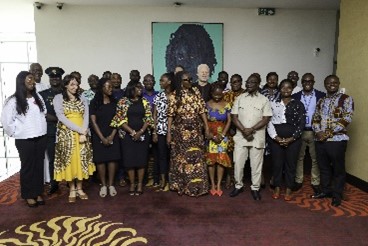Charting the Path to Fair Recruitment: Ghana Validates National Roadmap with ILO Support
Posted at November 29th 2024 12:00 AM | Updated as of November 29th 2024 12:00 AM
Region/Country : Ghana
|Themes : Fair recruitment
Labour migration has become a vital contributor to Ghana’s socio-economic development, offering opportunities for thousands of Ghanaians to seek livelihoods abroad. However, migrant workers, particularly those engaged in domestic work in the Middle East, continue to face severe exploitation, ranging from contract substitution and passport confiscation to forced labour. In response, the government of Ghana, through the Ministry of Employment and Labour Relations, is taking decisive action to safeguard its workers by implementing targeted initiatives in collaboration with the ILO’s Integrated Programme on Fair Recruitment Phase III (FAIR III), funded by the Swiss Development Cooperation, and the AU-ILO-IOM Joint Labour Migration Programme (JLMP)-Lead, funded by the Swedish International Development Cooperation Agency (SIDA).
One transformative milestone has been the development of the National Roadmap on Fair Recruitment, a comprehensive guide that institutionalizes fair recruitment practices and strengthens labour migration governance. A workshop to validate the roadmap was held on 29th November 2024 at the Kempinski Gold Coast City Hotel in Accra, with 35 participants from government ministries, social partners, development partners, the private sector, civil society, and the media.
The Director of Policy Planning, Monitoring, and Evaluation at the Ministry of Employment and Labour Relations (MELR) in her welcome address, emphasized the significance of the National Roadmap on Fair Recruitment.
“This roadmap is not merely a document; it is a strategic guide that reflects the aspirations, experiences, and expertise of all stakeholders—government, social partners, civil society, and the private sector. It outlines actionable steps to institutionalize fair recruitment practices and strengthen our governance frameworks for labour migration”.
She expressed profound gratitude to the International Labour Organization (ILO) and its FAIR III programme, the AU-ILO-IOM Joint Labour Migration Programme (JLMP)-Lead, as well as the Swiss Development Cooperation (SDC) and the Swedish International Development Cooperation Agency (SIDA), for their steadfast support.
The representant of the the Director of the ILO Country Office for Nigeria, Ghana, Liberia, Sierra Leone, and Liaison Office for ECOWASdescribed the roadmap as a visionary document that ensures migration is a choice and not a necessity:
“The National Roadmap represents a vision for a future where workers’ rights are protected, and recruitment is fair and transparent. We call on all stakeholders—government, employers, workers, civil society, and the private sector—to support its implementation.”
He assured participants of the ILO’s commitment to partnering with stakeholders to turn the roadmap into tangible actions that positively impact migrant workers.
The workshop focused on a comprehensive review of the National Roadmap on Fair Recruitment, facilitated by the planning Officer at MELR and provided a platform for participants to contribute feedback. The roadmap, developed through extensive national consultations, was validated, affirming its strategic priorities and actionable steps.
Reflecting on this achievement, The national Project Coordinator of FAIR III, described the roadmap as the culmination of collective efforts and a foundation for transformative action.
“The roadmap represents not only the culmination of our efforts but also the starting point for addressing gaps in Ghana’s recruitment and labour migration governance systems. Feedback from this workshop will be incorporated to finalize the document, which will then be disseminated through public forums, digital platforms, and direct engagements to ensure accessibility and inclusivity”
The national coordinator also indicated that FAIR III has already committed to supporting the government in implementing some of the action points outlined in the roadmap.
The workshop also reviewed FAIR III’s 2024 achievements, including identifying gaps in recruitment systems, building capacity among stakeholders, and expanding fair recruitment practices.
The workshop not only validated a crucial roadmap but also solidified commitments to ensuring that fair recruitment practices become a cornerstone of Ghana’s labour migration governance. Through collaboration and unwavering dedication, stakeholders pledged to transform the aspirations outlined in the roadmap into actionable outcomes that safeguard the rights and dignity of migrant workers.

